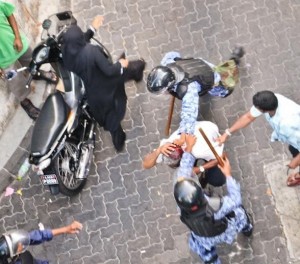The Judicial Service Commission (JSC) has transferred High Court Chief Judge Ahmed Shareef to the Juvenile Court as a disciplinary measure more than one year and two months after he was indefinitely suspended.
The judicial watchdog revealed in a press statement yesterday (August 6) that Shareef was found guilty of ethical misconduct following an investigation of a complaint filed by seven of his colleagues on the High Court bench.
The JSC did not divulge any details regarding the allegations.
However, in June 2012, the Anti-Corruption Commission was asked to investigate allegations that Chief Judge Shareef met officials of Malaysian mobile security firm Nexbis in Bangkok, Thailand while a case concerning the firm’s controversial border control project was scheduled at the High Court.
Hulhumalé magistrate court
Shareef was suspended on May 29, 2013 while he was presiding over a case filed by former President Mohamed Nasheed contesting the legitimacy of the JSC’s appointment of a three-judge panel at the Hulhumalé magistrate court.
The judges were appointed to preside over the opposition Maldivian Democratic Party presidential candidate’s trial concerning the military’s controversial detention of Criminal Court Chief Judge Abdulla Mohamed in January 2012.
In April 2013, the High Court had suspended the trial pending a ruling on the legitimacy of the magistrate court bench.
However, the High Court case has remained stalled since Shareef’s suspension the following month – more than a year after the complaint was filed against him.
JSC Chair and Supreme Court Justice Adam Mohamed Abdulla insisted at the time that the suspension was not related to the ongoing High Court case concerning Nasheed’s trial.
The suspension came shortly after the cancellation of a hearing in the Nasheed case which was scheduled at the High Court on the same day.
After voting against suspending Shareef, public representative on the JSC Shuaib Abdul Rahman told local media that the decision was made in violation of due process and JSC procedures as a report regarding the allegations was not presented to the commission’s members.
Shareef then challenged the JSC decision at the Civil Court contending that the suspension was unlawful. The court subsequently upheld the JSC decision in October 2013.
Stalled
In addition to Nasheed’s case, a number of high-profile cases over which Shareef was presiding have remained stalled since his suspension, including an appeal by Fathmath Hana, 18, who was sentenced to death for the murder of prominent lawyer Ahmed Najeeb.
Shareef was also among the panel of judges hearing appeals from the Prosecutor General’s (PG) Office over the acquittals of President Abdulla Yameen’s brother Abdulla Algeen on corruption charges and suspected drug kingpin Mohamed Hussain Manik.
According to the Judicature Act, the chief judge of a court has the administrative authority to appoint judges to preside over cases and make changes to panels. The Supreme Court had also ruled that acting chief judges do not have the authority to make such changes.
In June, the JSC appointed Judge Abdulla Hameed to head the High Court for a period of six months.
Meanwhile, in April, Nasheed asked the High Court to expedite the case concerning the legitimacy of the magistrate court bench.
Nasheed’s lawyer Hassan Latheef told Minivan News at the time that the former president did not wish to have pending criminal charges. Nasheed had previously said he was “prepared” to justify the reasons for the arrest of Judge Abdulla and defend the decision at court.
In June, the High Court summoned members of Nasheed’s legal team to sign statements given at previous hearings.
Two of the three judges appointed to the magistrate court to preside over Nasheed’s trial have meanwhile been transferred to other courts. Judge Shujau Usman was transferred to the Criminal Court and Judge Hussain Mazeed to the Civil Court.
Meanwhile, according to the JSC’s annual report for 2013, the commission has yet to conclude investigations or make a decision regarding 106 cases, which were pending at the end of last year, including one complaint dating back to 2008 and four complaints from 2009.
In a comprehensive report on the Maldivian judiciary released in May 2013, UN Special Rapporteur for the Independence of Judges and Lawyers, Gabriela Knaul, observed that a lack of transparency concerning the JSC’s proceedings “nourishes serious allegations of selectivity in the management of complaints.”
